Lee Chun-hee, a master singer of Gyeonggi Minyo, a genre of traditional folk songs from Gyeonggi-do (Gyeonggi Province), won the Deutschen Schallplattenkritik award for her album “Arirang and Minyo Singing.”
The 67-year-old virtuoso released the album last January through Radio France, a French public service radio broadcaster and record producer. It features 11 signature pieces from her repertoire that she has been singing throughout her career.
The songs include “Gin Arirang,” “Gu Arirang,” “Arirang,” “Noratgarak,” “Changbu Taryeong,” “Nodeul Gangbyeon,” “Taepyeongga,” “Ibyeolga,” “Hoesimgok” and, lastly, “Hoesimgok.”
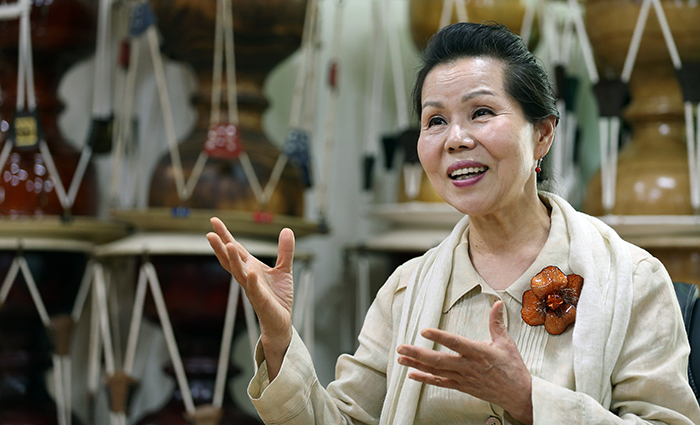
Minyo singer Lee Chun-hee has been performing for the past five decades. (photo: Jeon Han)
“The way I felt, at the news of winning the award that morning, is beyond description,” said Lee. “All these past years, the thought had run through my mind. I was so overwhelmed, I cried my eyes out. It was not a celebration just for me, but a day of congratulations for all Gyeonggi-do sounds.”
Established in 1980, the German award is one of the most prestigious awards in Europe. A panel of more than 145 experts, including music critics, scholars and music program producers, select the winners across 29 categories every year.
“Her songs turn Korean folk songs, embracing shamanistic elements, into a form of art,” said one of the panelists.
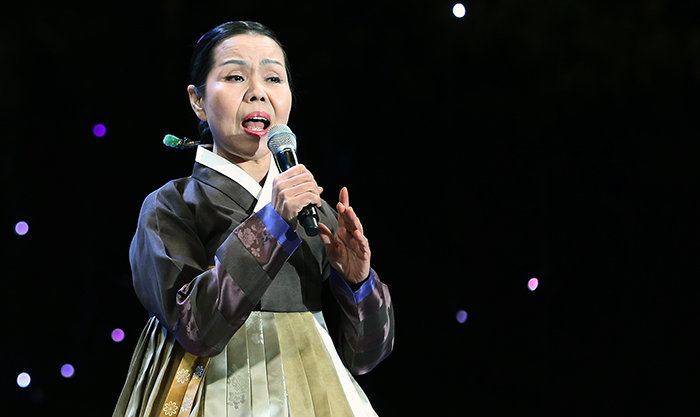
Singer Lee Chun-hee sings "Arirang" at a concert held at Cheong Wa Dae on October 27 last year. (photo: Jeon Han)
Lee has been sticking only with traditional Gyeonggi Minyo songs for more than 50 years. Despite financial difficulties and strong opposition from her parents, she stuck to her guns.
Lee started training in minyo techniques when she met the then celebrated master singer Lee Chang-bae at a minyo academy she discovered by chance.
The young singer studied under the master for ten years, and then met another master, An Bi-chui (1926-1997), who was one of only three holders of Important Intangible Cultural Asset certification No. 57 for Gyeonggi Minyo. Since then, her singing ability advanced by leaps and bounds.
In 1997 when she turned 50, Lee followed in the footsteps of her teacher, An, and became a holder of that Important Intangible Cultural Asset certification herself. Many people recognize her as the best singer in this particular traditional genre.
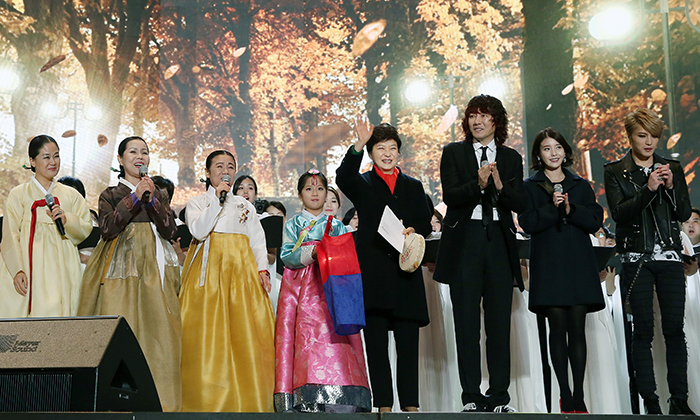
Master singer Lee Chun-hee (second from left) sings "Arirang" together with President Park Geun-hye (fourth from right) and other performers during a special concert held at Cheong Wa Dae on October 27 last year. (photo: Jeon Han)
Nowadays, Lee is focusing on fostering talented students at universities and at the Korean Traditional Folk Song Association, students who, she thinks, will help keep Gyeonggi Minyo alive.
Korea.net recently met with the master singer to hear more about her 50-year singing career.
- Since you started singing Gyeonggi Minyo at the age of 16, you've stuck with that genre for about five decades. For our audiences who don't know the genre at all, please explain what it is.
I would say it is, "the sound of Seoul." It stems from the region around Gyeonggi-do and Seoul. The tunes in Gyeonggi Minyo songs sound very fresh, clear and transparent. The sounds are quite intriguing.
- Tell us more about how you got into traditional Gyeonggi Minyo music.
I am a native of Seoul. I was born here and have lived here all my life. That's why I instantly got struck by the sounds of my birthplace, I think. In my childhood, Gyeonggi Minyo was a popular style of song. At that time, I could often hear such songs coming from the radio. The first time I heard one of the songs, I immediately got drawn to its clear, pure musicality. Whenever I listened, the music always lingered in my ears for a while. When I heard any minyo song on the street, I stopped to listen until it was over.
At that time, I didn't know there was a minyo academy. After training at an ordinary music school for three years, I went to an academy specialized in minyo, where I met my first teacher, Lee Chang-bae.
One day, he asked me, "What does music mean to you?" I couldn't give an answer right away. I started a life-or-death wrestle with myself, trying to find the answer. I practiced over and over again.
At that time, a recording device or anything high-tech was hard to get. So, I had to memorize all the notes at once when I heard a certain song. Then I practiced from memory. I even walked into telephone poles many times, since I was focused on practicing my singing as I was walking along.
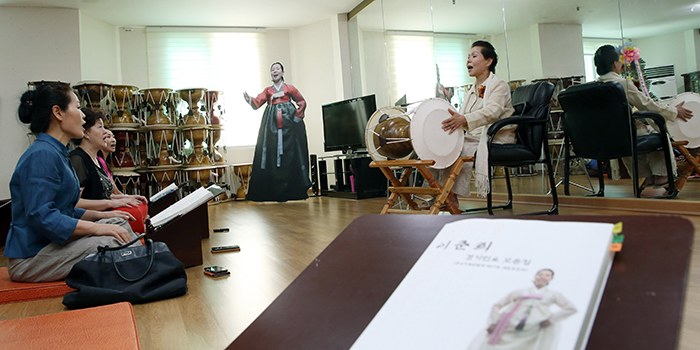
Gyeonggi Minyo master singer Lee Chun-hee teaches her students. (photo: Jeon Han)
- What was it that fascinated you the most about Gyeonggi Minyo music?
The first time I heard it, a chill ran through my whole body. When I sang a piece to the rhythms my teacher made on his knee, he didn’t believe that it was my first time to sing the song, saying, “You definitely learned this somewhere else, didn’t you?”
Honestly, three months into the course, I found it a bit boring. Of course, I always enjoyed every moment of the learning, and then when I turned around, I was like, “What’s the use of learning this thing?”
I thought that it was a piteous sight to see only a few people sitting around a tiny attic, playing the janggu drum and singing.
Such doubts came back again and again. Then, the next day, when I sang with my teacher, I had a, “Yes, I made a right decision to do this,” kind of feeling once again. I had an endless string of inner conflicts.
However, the more I sang the music, the deeper I fell in love with it.
- What made you decide to become a singer? What was it that motivated you to stay on the path for more than 50 years?
It was when I met my second teacher, An Bi-chui, in 1975. That was the year when she became a holder of the Important Intangible Cultural Asset certification for Gyeonggi Minyo. Also, she selected me as her pupil. It was a moment, like, “This is what I have to do.”
If I didn't love this job, I wouldn't have been able to do it. Unless I am crazy enough about this, I cannot do it. Even after I was determined to go this way, I faced endless struggles with myself, both emotionally and physically.
I just kept going, with the sole goal of becoming a "master singer” in the field.
Once, some broadcasting producers gave me a blush of shame when they said I was too ugly to be on TV. That was really embarrassing, but I wouldn’t let it discourage me. I was, like, “I will make up for my 'unattractive' looks with my singing skills. I will survive and become the best Lee Chun-hee I can be.” I practiced over and over again.
- You must have had difficulties while being in the field over the past five decades. When was it tough for you?
It was the financial difficulties. Those who have strived in this field for many years, like me, are unlikely to be rewarded well for what they have done. Whenever I experienced that, or saw my peers experience that, I felt a strong sense of regret.
There was a time when I had to catch two buses, but I sadly didn’t have enough money to transfer to the other. So I took just one bus and then had to walk the rest of the way. I was that hungry.
However, I finally saw a light at the end of the tunnel in 1996, the year the government designated “The Year of Gugak,” or of traditional Korean music. I was so overwhelmed that I shed tears, I remember. Since that designation, many gugak singers started getting work. A growing number of universities started to open traditional music departments. Gugak classes started springing up at cultural centers across many parts of the country.
In the following year, another crisis came to me. It was in January of 1997 when my teacher, An, passed away. Since I was her pupil, I had been around her all the time. She was not just my teacher, but a family member and like a mother to me. When she passed away, it felt like the world was caving in.
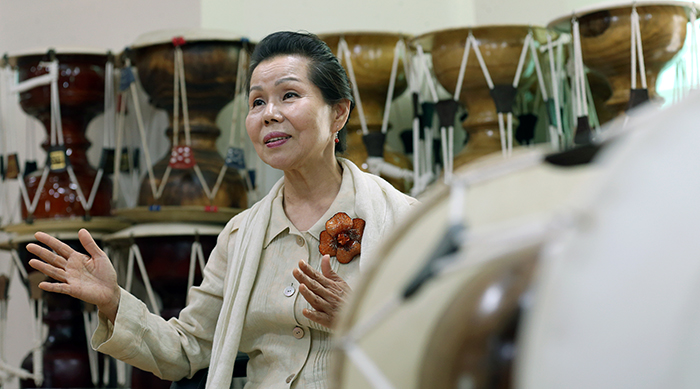
Gyeonggi Minyo master singer Lee Chun-hee says, “Singing is my life.” (photo: Jeon Han)
- We heard that you suffered from severe stage fright. How did you get over it?
To get over it, I repeated a stand-up-and-sit-down exercise. I remember that I did the exercise thousands and thousands of times for a whole year leading up to my debut performance in 1985. I did it so much that muscles built up in my legs and one year later, the stage fright disappeared. Doing the routine, my singing skills, too, improved so much that I could even sing while running around. From then on, I started being called a “master singer.”
Nowadays, I have another sort of “fright.” I still feel nervous, as I think I have to live up to so many expectations. I still practice hard, lest that I be asked by the audience, “Is she a real master singer, or only when she sings that way?”
I still find that being on stage makes me feel tense, whether big or small. That’s why I tell my pupils, “No matter how small, any stage is always big. I mean, when you are on a small stage, people can hear you up-close, enough to catch every single sound you make.”
You should sing with all your heart on any stage, always being careful about how to handle the movements of your eyes and arms.
- You have been active in spreading Gyeonggi Minyo by holding concerts in many parts of the world, especially across Europe, including in Germany and France. Do you feel any difference in global audiences’ reaction to your music compared to that you received 50 years ago?
France holds three big festivals every year. One of them took place last March in Paris where I opened the festival with the very repertoire on my most recent album, the album which won the German award.
Many people said that it was a miracle that a Korean singer, especially one who even specialized in minyo, would open such a big festival in the country. It was really a touching moment. I felt honored to have that great opportunity. All kinds of memories of ordeals and difficult times went through my mind.
I had the same feeling when I held my first solo concert in Germany in 2011. I was so impressed by the German people, who didn’t even understand the lyrics of my songs, but listened carefully all throughout the concert. After that concert, I was showered with a big round of applause and cheers. I was really proud of myself. I will never forget that moment.
- Do you have any dreams you have not yet achieved?
One of my dreams is to establish a company specializing in Gyeonggi Minyo traditional Korean music, where members can get a monthly wage. I know the traditional genre is sometimes difficult to access and success there is something hard to achieve.
Fortunately, there are some gugak kindergartens, middle and high school, but there are as yet no such elementary schools. I think that we will have more master singers if we let them start and learn the basics from an early age. For that reason, it would be great to have some gugak elementary schools.
- Have you by now found the answer to your teacher's question from fifty or something years ago? What does singing mean to you?
Singing, or sori, is my life. I went through numerous moments of frustration and self-doubt, but I did it all because I loved the music. My passion and love for the music has kept me going and brought me where I am now. In retrospect, I was meant to do this and the music has been my whole life. I hope to see many people make this beautiful music part of their lives, as I've done.
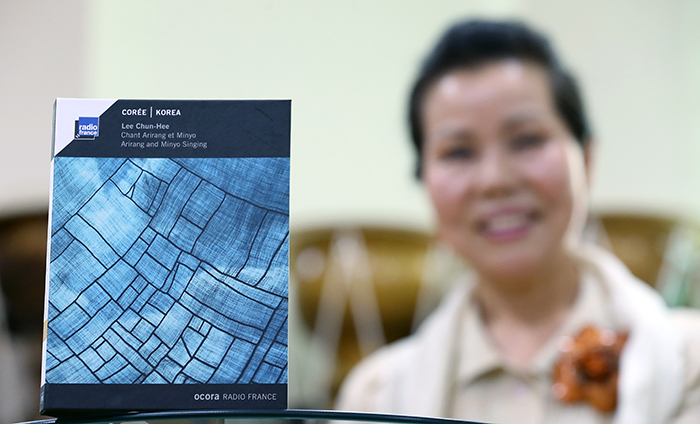
Pictured is the “Arirang and Minyo Singing” album for which master singer Lee Chun-hee won the famed Deutschen Schallplattenkritik award on May 15. (photo: Jeon Han)
- If you had any single piece of advice for your students, what would it be?
Any student may not be satisfied with every aspect of what they are doing. They might feel at some point that something is going wrong or that something is missing. No matter how hard your path might be, don’t feel discouraged. If you keep going as you’ve done so far, I am sure you will “get there.” I’d like to say, “Be strong and be patient to the end.”
- We are curious how you would describe the multi-faceted song "Arirang."
"Arirang" has long been known as a song that represents the feeling of han, or 恨, a feeling of deep sorrow that exists inside many Korean people. However, I think the song is the sound of hope. It represents the bright future of Korea.
By Sohn JiAe
Korea.net Staff Writer
jiae5853@korea.kr